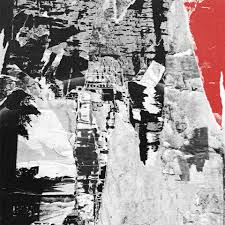The Soft Moon seemed an incredibly exciting proposition when their self-titled debut album emerged in 2010. Fusing heavy, droning neo-psych and synth-driven krautrock with gothic post-punk, they created a hybrid that felt like more than just the sum of its parts. The glut of bands mining similar influences since, as well as a somewhat disappointing, treading-water follow-up – 2012’s Zeroes – has rather diluted expectations for this, their third full-length outing. But it soon becomes apparent that in Deeper the Soft Moon have re-emerged not just rejuvenated but in a position to regain their original lead over the competition and then some.
The album’s title could be passed over as a glib and meaningless, but in fact it’s entirely apposite. If Zeroes seemed all surface, as though Luis Vasquez (who for all intents and purposes is the Soft Moon) was reluctant to break the shimmering mirror of its cold still waters, then Deeper finds him plunging fearlessly in, both musically and emotionally. Indeed the human connection, the sense of real guts that was missing on Zeroes is here all too present, on a record that feels messy, desperate and at the end of its tether- yet also ironically accomplished, impeccably crafted and resolutely forward-looking.
We’re told that Deeper deals with themes of "Suicide, vulnerability and what it means to heal," and certainly first single ‘Black’ finds Vasquez vocalising in spat-out whispers over cold machine pulses, as though giving any kind of voice to his emotional reality is an experience of physical torture, as well as a technological near-impossibility. The sound is overtly mechanical but the layered, unreliable textures seem almost organic, as sudden synthesiser chords uncoil like the tendrils of some sprouting jungle plant.
‘Far’ occupies more familiar territory, riding the kind of flanged one-note bassline that the Soft Moon have singularly appropriated from the Banshees’ Steven Severin and made their own. Vasquez’s urgent vocals collide with an itchy guitar riff, creating future pop music that draws on late seventies / early eighties post-punk but doesn’t attempt to slavishly recreate it. The likes of New Order and Depeche Mode are glimpsed as ancestors, but are no longer pastiched or obviously referenced. The Soft Moon have left the home planet and are heading for new territories, and if this music is gothic then it’s a space age gothic; starships constructed as vast arched temples, gleaming plastic favoured over blackened granite, the gargoyles shifting 3-D holograms and the keystone merely compressed data. And at the heart of this creation Vasquez is writhing, pinned to the altar, trying hopelessly to escape himself; in this Sadean sci-fi nightmare, identity is the prison and self-awareness the merciless jailer.
‘Wasting’ tries to accept life on its own terms, as the only game in town, and floats in not-quite zero gravity; the heavy plod of the guitar still pulling back even as the vapour trail of melody tries to break free and soar. This is malfunctioning pop music as made by slightly defective replicants, their artificial facial muscles just missing a believable simulation of human emotion, their plastic skin slowly decaying rather than ageing convincingly. On ‘Wrong’ we career down the endless hexagonal white corridors of 1970s SF movies as blunted, muffled acid house flashes and ricochets like broken synapses, and gradually the band’s name starts to make sense, above and beyond its simple, elegant surrealism; a malleable satellite, a dead plastic planet still drawing the tides, an elusive, ungraspable, conditional symbol of all our unreachable dreams and aspirations.
Certainly themes of death, isolation and the nauseous plasticity of life itself seem to predominate. The hyper-ventilating vocals on ‘Desertion’ seem close to panic as the beats hammer-echo like an MRI scan. The ominous piano chords of ‘Without’ have a disruptive naturalism, while the voice in contrast seems of a piece with the grating electronic static that builds up behind. Another meditation on loss and loneliness, the song is structured around repetition and never attempts to build a false, self-aggrandising narrative of tragedy and pity from the pain it expresses. It just is, which makes the bouncing beats and elastic bass of ‘Feel’ immediately afterwards all the more jolting, though the lyric- "I feel so shallow inside / why am I alive?"- suggest that the forced jollity is barely skin deep. Next, the percussive title track sounds like the Creatures, as rebuilt by Daft Punk, with ritual, tribal-sounding chants and rhythms given an otherworldly electronic sheen.
"I can’t see my face. I don’t know who I am. What is this place? I don’t know where I am." A supposedly tape-recorded voice repeats this litany through ‘Being,’ bringing the existential investigation to its inevitable conclusion: that it’s impossible to ever truly know ourselves, or to ever understand existence from within. Over the course of three minutes the voice builds from a whisper to a scream, the drum machine and synthesisers attacking like swooping birds of prey plucking eyes and entrails from Prometheus on the rock, before the track breaks down into a further three minutes of looped, impenetrable static and noise. Is that all there is, as Peggy Lee once asked? Balancing this realisation with artfully constructed creations like Deeper may amount to nothing more than assembling matchstick churches and hurling them into the void; but the semblance of structures makes us realise that we are not in fact alone. And eventually, even our own faces may become clear.
<div class="fb-comments" data-href="http://thequietus.com/articles/17462-the-soft-moon-deeper-review” data-width="550">


